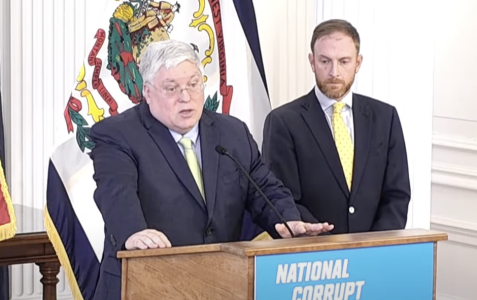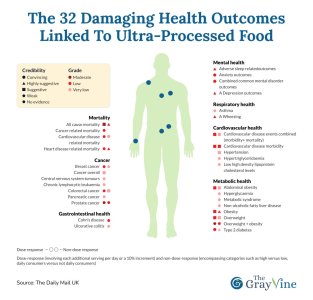This could change what you eat—State targets 9 cancer-causing ingredients
- Replies 1
In a groundbreaking move that's sending ripples across the nation, one state has taken a bold step in public health by banning nine food additives linked to cancer.
This legislative action represents the most significant overhaul of food safety regulations in the United States in recent years.
But what does this mean for the average consumer, and could this be the tipping point for other states to follow suit?
West Virginia has decided to ban thousands of products that contain nine food additives that have been connected to cancer and hyperactivity in children.
The list of banned substances includes a mix of dyes and preservatives commonly found in a variety of processed foods—from the chips and candy in our pantries to the colorful sodas in our refrigerators.
The culprits? Red Dye No. 40, Yellow Dye No. 5, Yellow Dye No. 6, Blue Dye No. 1, Blue Dye No. 2, Green Dye No. 3, butylated hydroxyanisole (BHA), propylparaben, and Red 3 (which was recently banned by the FDA on a federal level).
These additives have been under scrutiny for their potential health risks, including tumor growth in animal studies.

The state has long struggled with some of the nation's highest rates of obesity, diabetes, and other chronic conditions.
By eliminating these harmful chemicals from the food supply, West Virginia aims to tackle these health challenges head-on and set a precedent for the rest of the country.
While the ban is a significant step forward, it's not without its challenges. Food manufacturers have been given a grace period until January 2028 to reformulate their products, but industry representatives warn that such changes could lead to higher food prices.
Additionally, the ban's reach extends to school cafeterias, where the prohibited additives must be phased out by August of this year.
The ban has sparked a national conversation about the role of state versus federal regulation in food safety.
The National Confectionary Association has expressed concerns about the “patchwork approach,” advocating for a consistent, science-based regulatory framework led by the FDA. They argue that state-specific regulations could lead to consumer confusion and increased food costs, making products less accessible to those who need them most.
Despite the controversy, West Virginia's ban is more comprehensive than similar legislation in other states, such as California's prohibition of six dyes in school foods.
Republican Governor Patrick Morrisey signed House Bill 2354 on Monday and used the moment to thank anti-processed food advocate Robert F. Kennedy Jr. and President Donald Trump for their support.
Source: BBC News / Youtube.
"West Virginia ranks at the bottom of many public health metrics, which is why there’s no better place to lead the Make America Healthy Again mission," Morrisey said during the bill signing.
The legislation follows concerns about West Virginia’s alarmingly high rates of obesity and diabetes, two conditions that have been linked in studies to synthetic food additives.
The state has long been among the lowest-ranked in the country in terms of health indicators like life expectancy, obesity, chronic illness, and smoking.
"By eliminating harmful chemicals from our food, we’re taking steps toward improving the health of our residents and protecting our children from significant long-term health and learning challenges," Morrisey added.
Governor Patrick Morrisey continued his remarks by thanking those involved in supporting the legislation: "Thank you to the Legislature, HHS Secretary Robert Kennedy, and the entire Trump Administration for helping us launch this movement right here in West Virginia."
Delegate Evan Worrell, who co-sponsored the bill, credited Robert F. Kennedy Jr.’s Make America Healthy Again (MAHA) campaign for inspiring his efforts.
He believes removing artificial dyes may help curb behavioral challenges in schools. "We have some behavioral issues in our school system," Worrell previously said. "I won't point all of them to food dyes, but it is a contributing factor."
West Virginia currently has the third-highest rate of ADHD diagnoses among children aged 3 to 17, with 12–15% diagnosed, compared to a national average of 10%.

A 2024 Forbes Advisor analysis ranked the state highest in adult smoking and obesity rates, and it leads the country in diabetes-related deaths, with about 42 deaths per 100,000 residents—well above the CDC's national average of 30 per 100,000. The state also has the second-lowest life expectancy, at 74 years, which is 3.5 years below the national average.
This legislation goes even further than California's 2023 School Food Safety Act, which banned six artificial food dyes—including Red 40 and Yellow 5—from school meals. In contrast, West Virginia's law applies statewide, affecting a broader range of food and beverage products.
Many of the banned ingredients are found in popular snacks and drinks. Red 40 and Red 3 appear in candies, sodas, chips, and cake mixes, while Yellow 5 and Yellow 6 are found in items like Doritos, cookies, and sugary cereals.
Some dyes, like Blue 1, Blue 2, and Green 3, are used in candies, drinks, and salad dressings, and have been linked in animal studies to hyperactivity, DNA damage, and tumor growth.
Also read: Are you a fan of this refreshing drink? Immediate recall issued due to cancer-linked chemical!
BHA and propylparaben, found in products such as butter, beer, potato chips, and cured meats, have been shown to act as endocrine disruptors and have been linked to tumor development and reproductive system issues in various studies.
Governor Morrisey said the measure is about promoting long-term change. "Today’s announcement represents a step toward a productive dialogue about how West Virginia and our country can eat healthier and address some of the vexing health care problems facing our citizens," he said.
"Through the implementation process, I look forward to advancing policies which improve our health care outcomes, maintain our jobs, and respect the FDA’s and supply channel’s role in the process."
In response, the National Confectioners Association issued a statement warning that the new law could have unintended consequences: "Governor Morrisey’s decision to sign HB 2354 will have immense impact on his state, making food more expensive and less accessible for people in West Virginia."
Source: CBS Mornings / Youtube.
The group criticized the law’s potential to confuse consumers and disrupt the food supply, adding: "FDA is the rightful national regulatory decision maker and leader in food safety... Our consumers and everyone in the food industry want and expect a strong FDA, and a consistent, science-based national regulatory framework – and this patchwork approach will only lead to consumer confusion as food costs rise and products become less accessible to West Virginians."
Governor Morrisey described the legislation as a starting point for broader reform, stating, "Today’s announcement represents a step toward a productive dialogue about how West Virginia and our country can eat healthier and address some of the vexing health care problems facing our citizens." He added, "Through the implementation process, I look forward to advancing policies which improve our health care outcomes, maintain our jobs, and respect the FDA’s and supply channel’s role in the process."
In response, the National Confectioners Association, which represents a wide range of food and beverage manufacturers, expressed concern over the law’s potential consequences. In a statement, the group said, "Governor Morrisey’s decision to sign HB 2354 will have immense impact on his state, making food more expensive and less accessible for people in West Virginia."
In earlier news: Are the foods you're eating safe? Why Americans are fighting to ban these common food ingredient
The organization emphasized the need for federal consistency in food regulation, noting, "There is a role for state legislators and public health officials to play in the ongoing conversation about food additives, but – as we have been saying for years – FDA is the rightful national regulatory decision maker and leader in food safety."
They reiterated their commitment to public safety, stating, "Food safety is the number one priority for US confectionery companies, and we will continue to follow and comply with FDA’s guidance and safety standards."
However, they cautioned that inconsistent policies across states could create confusion and drive up prices: "Our consumers and everyone in the food industry want and expect a strong FDA, and a consistent, science-based national regulatory framework – and this patchwork approach will only lead to consumer confusion as food costs rise and products become less accessible to West Virginians."
Read next: Is your favorite food banned? The truth about the ingredient behind these recent bans

How do you feel about West Virginia's ban on these food additives? Do you think other states should follow suit? Have you or someone you know been affected by the health issues associated with these substances? Share your stories and opinions in the comments below!
This legislative action represents the most significant overhaul of food safety regulations in the United States in recent years.
But what does this mean for the average consumer, and could this be the tipping point for other states to follow suit?
West Virginia has decided to ban thousands of products that contain nine food additives that have been connected to cancer and hyperactivity in children.
The list of banned substances includes a mix of dyes and preservatives commonly found in a variety of processed foods—from the chips and candy in our pantries to the colorful sodas in our refrigerators.
The culprits? Red Dye No. 40, Yellow Dye No. 5, Yellow Dye No. 6, Blue Dye No. 1, Blue Dye No. 2, Green Dye No. 3, butylated hydroxyanisole (BHA), propylparaben, and Red 3 (which was recently banned by the FDA on a federal level).
These additives have been under scrutiny for their potential health risks, including tumor growth in animal studies.

West Virginia has passed legislation banning nine food additives linked to cancer and other health issues, sparking the biggest shakeup of US food in recent times. Image source: Denny Müller / Unsplash.
The state has long struggled with some of the nation's highest rates of obesity, diabetes, and other chronic conditions.
By eliminating these harmful chemicals from the food supply, West Virginia aims to tackle these health challenges head-on and set a precedent for the rest of the country.
While the ban is a significant step forward, it's not without its challenges. Food manufacturers have been given a grace period until January 2028 to reformulate their products, but industry representatives warn that such changes could lead to higher food prices.
Additionally, the ban's reach extends to school cafeterias, where the prohibited additives must be phased out by August of this year.
The ban has sparked a national conversation about the role of state versus federal regulation in food safety.
The National Confectionary Association has expressed concerns about the “patchwork approach,” advocating for a consistent, science-based regulatory framework led by the FDA. They argue that state-specific regulations could lead to consumer confusion and increased food costs, making products less accessible to those who need them most.
Despite the controversy, West Virginia's ban is more comprehensive than similar legislation in other states, such as California's prohibition of six dyes in school foods.
Republican Governor Patrick Morrisey signed House Bill 2354 on Monday and used the moment to thank anti-processed food advocate Robert F. Kennedy Jr. and President Donald Trump for their support.
Source: BBC News / Youtube.
"West Virginia ranks at the bottom of many public health metrics, which is why there’s no better place to lead the Make America Healthy Again mission," Morrisey said during the bill signing.
The legislation follows concerns about West Virginia’s alarmingly high rates of obesity and diabetes, two conditions that have been linked in studies to synthetic food additives.
The state has long been among the lowest-ranked in the country in terms of health indicators like life expectancy, obesity, chronic illness, and smoking.
"By eliminating harmful chemicals from our food, we’re taking steps toward improving the health of our residents and protecting our children from significant long-term health and learning challenges," Morrisey added.
Governor Patrick Morrisey continued his remarks by thanking those involved in supporting the legislation: "Thank you to the Legislature, HHS Secretary Robert Kennedy, and the entire Trump Administration for helping us launch this movement right here in West Virginia."
Delegate Evan Worrell, who co-sponsored the bill, credited Robert F. Kennedy Jr.’s Make America Healthy Again (MAHA) campaign for inspiring his efforts.
He believes removing artificial dyes may help curb behavioral challenges in schools. "We have some behavioral issues in our school system," Worrell previously said. "I won't point all of them to food dyes, but it is a contributing factor."
West Virginia currently has the third-highest rate of ADHD diagnoses among children aged 3 to 17, with 12–15% diagnosed, compared to a national average of 10%.

The banned substances include several dyes and preservatives that must be removed from products by January 2028, with schools starting to prohibit these in August of the current year. Image source: WBOY 12 News / Youtube.
A 2024 Forbes Advisor analysis ranked the state highest in adult smoking and obesity rates, and it leads the country in diabetes-related deaths, with about 42 deaths per 100,000 residents—well above the CDC's national average of 30 per 100,000. The state also has the second-lowest life expectancy, at 74 years, which is 3.5 years below the national average.
This legislation goes even further than California's 2023 School Food Safety Act, which banned six artificial food dyes—including Red 40 and Yellow 5—from school meals. In contrast, West Virginia's law applies statewide, affecting a broader range of food and beverage products.
Many of the banned ingredients are found in popular snacks and drinks. Red 40 and Red 3 appear in candies, sodas, chips, and cake mixes, while Yellow 5 and Yellow 6 are found in items like Doritos, cookies, and sugary cereals.
Some dyes, like Blue 1, Blue 2, and Green 3, are used in candies, drinks, and salad dressings, and have been linked in animal studies to hyperactivity, DNA damage, and tumor growth.
Also read: Are you a fan of this refreshing drink? Immediate recall issued due to cancer-linked chemical!
BHA and propylparaben, found in products such as butter, beer, potato chips, and cured meats, have been shown to act as endocrine disruptors and have been linked to tumor development and reproductive system issues in various studies.
Governor Morrisey said the measure is about promoting long-term change. "Today’s announcement represents a step toward a productive dialogue about how West Virginia and our country can eat healthier and address some of the vexing health care problems facing our citizens," he said.
"Through the implementation process, I look forward to advancing policies which improve our health care outcomes, maintain our jobs, and respect the FDA’s and supply channel’s role in the process."
In response, the National Confectioners Association issued a statement warning that the new law could have unintended consequences: "Governor Morrisey’s decision to sign HB 2354 will have immense impact on his state, making food more expensive and less accessible for people in West Virginia."
Source: CBS Mornings / Youtube.
The group criticized the law’s potential to confuse consumers and disrupt the food supply, adding: "FDA is the rightful national regulatory decision maker and leader in food safety... Our consumers and everyone in the food industry want and expect a strong FDA, and a consistent, science-based national regulatory framework – and this patchwork approach will only lead to consumer confusion as food costs rise and products become less accessible to West Virginians."
Governor Morrisey described the legislation as a starting point for broader reform, stating, "Today’s announcement represents a step toward a productive dialogue about how West Virginia and our country can eat healthier and address some of the vexing health care problems facing our citizens." He added, "Through the implementation process, I look forward to advancing policies which improve our health care outcomes, maintain our jobs, and respect the FDA’s and supply channel’s role in the process."
In response, the National Confectioners Association, which represents a wide range of food and beverage manufacturers, expressed concern over the law’s potential consequences. In a statement, the group said, "Governor Morrisey’s decision to sign HB 2354 will have immense impact on his state, making food more expensive and less accessible for people in West Virginia."
In earlier news: Are the foods you're eating safe? Why Americans are fighting to ban these common food ingredient
The organization emphasized the need for federal consistency in food regulation, noting, "There is a role for state legislators and public health officials to play in the ongoing conversation about food additives, but – as we have been saying for years – FDA is the rightful national regulatory decision maker and leader in food safety."
They reiterated their commitment to public safety, stating, "Food safety is the number one priority for US confectionery companies, and we will continue to follow and comply with FDA’s guidance and safety standards."
However, they cautioned that inconsistent policies across states could create confusion and drive up prices: "Our consumers and everyone in the food industry want and expect a strong FDA, and a consistent, science-based national regulatory framework – and this patchwork approach will only lead to consumer confusion as food costs rise and products become less accessible to West Virginians."
Read next: Is your favorite food banned? The truth about the ingredient behind these recent bans
Key Takeaways
- West Virginia has passed legislation banning nine food additives linked to cancer and other health issues, sparking the biggest shakeup of US food in recent times.
- The banned substances include several dyes and preservatives that must be removed from products by January 2028, with schools starting to prohibit these in August of the current year.
- The move is in response to West Virginia's poor public health metrics, including high rates of obesity, diabetes, and other chronic diseases, which have been connected to synthetic food ingredients.
- Industry representatives argue that the legislation will increase food prices and create a patchwork regulatory environment, while health advocates and state officials argue it will lead to better health outcomes and set a precedent for other states to follow.
How do you feel about West Virginia's ban on these food additives? Do you think other states should follow suit? Have you or someone you know been affected by the health issues associated with these substances? Share your stories and opinions in the comments below!
Last edited:







